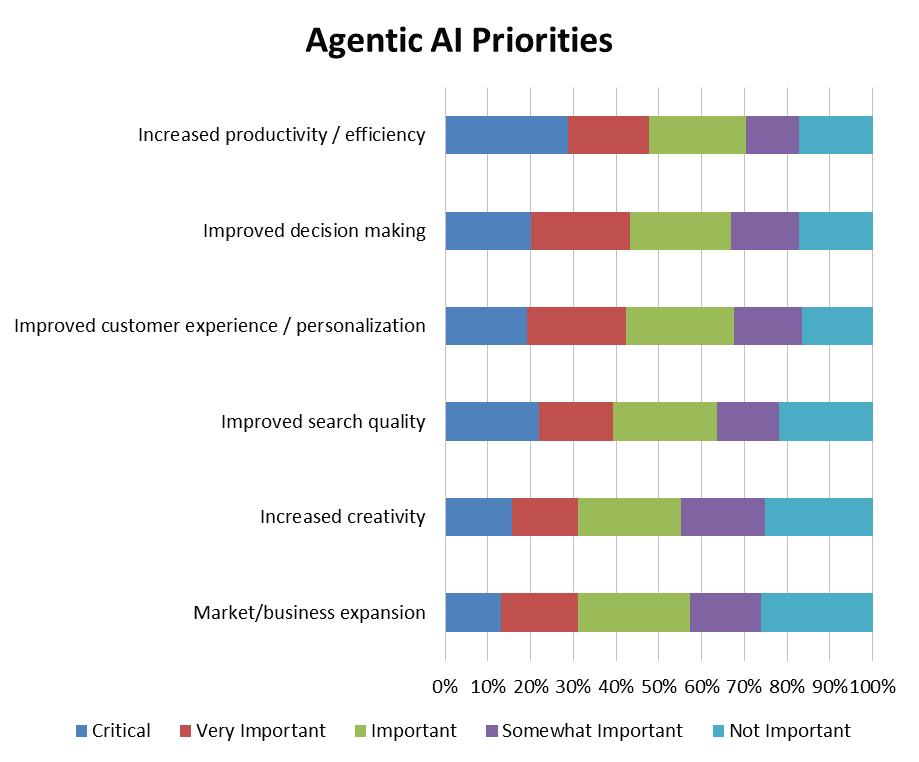A number of years in the past, I heard the CTO of PeopleSoft share the story of how his firm started. PeopleSoft was based throughout the period of client-server computing, when human assets software program was dominated by a lot bigger corporations that ran completely on mainframes. On the time, PeopleSoft anticipated these incumbents to rapidly reply to the brand new mannequin. As an alternative, inside only a few years, lots of these once-dominant distributors had disappeared.
Paradoxically, historical past practically repeated itself. Years later, PeopleSoft discovered that the rise of the web as soon as once more reshaped enterprise functions, forcing software program corporations to rethink their architectures and supply fashions. And after Oracle acquired PeopleSoft, the shift to the cloud once more rewrote the foundations of the sport. Every tech shift created winners and losers, relying on who seized the inflection level quick sufficient.
Agentic AI Is the Subsequent Turning Level
The enterprise software program business is standing at one other such turning level. This time, the disruptive drive is agentic AI. Workday — broadly seen because the successor to PeopleSoft — has made it clear in its latest bulletins that ERP programs are now not confined to being passive “programs of file.” In accordance with Workday’s CTO, the long run lies in making them “programs of motion.” The distinction is profound. As an alternative of bolting AI onto present workflows, the chance lies in weaving agentic AI into the guts of enterprise processes, enabling programs to not solely report and suggest but in addition to take motion.
Workday just isn’t alone in seizing upon this shift. Throughout the software program business, leaders see agentic AI as a generational change on par with client-server, the Web, and the cloud. The query is now not whether or not agentic AI will redefine enterprise software program, however how rapidly organizations will adapt — and which corporations will seize aggressive benefit.
Why Distributors Are Prioritizing Agentic AI
A putting 68.5% of software program distributors are already supporting agentic AI — and many of the relaxation plan to comply with inside the subsequent 12 months, in response to the “Agentic AI Report 2025” from Dresner Advisory Providers. This overwhelming alignment indicators greater than a pattern; it marks an industrywide inflection level.
As Rita McGrath explains in “Seeing Round Corners,” an inflection level is “a change within the enterprise surroundings that dramatically shifts some component of an organization’s actions, throwing sure taken-for-granted assumptions into query.”
That is precisely what we’re witnessing as we speak. Distributors are rethinking their architectures, product highway maps, and buyer commitments in response to the quickly shifting expertise panorama. For enterprise leaders, this is not only a sign — it is a name to behave.
Key Drivers Behind Vendor Adoption
When requested why they’re prioritizing agentic AI capabilities, distributors revealed a transparent hierarchy of motivations, as outlined within the Dresner report. Two-thirds cited market differentiation, future-proofing, buyer demand, and aggressive necessity as their prime drivers. In different phrases, agentic AI just isn’t seen as an optionally available innovation however as a baseline requirement to stay aggressive and related available in the market.
On the identical time, a majority of distributors pointed to operational imperatives. This displays a sober recognition that inside programs and providers should evolve as rapidly as buyer expectations. In impact, agentic AI is forcing corporations to rethink not solely what they construct for patrons but in addition how they function themselves.
(Supply: Dresner Advisory Providers)
The above analysis surfaced six core options that repeatedly emerged as important to enabling enterprise-scale AI initiatives:
-
Knowledge integration or virtualization.
-
Integration with foundational fashions.
-
Predictive and proactive programs.
Every functionality performs a definite function in designing and executing clever, agentic workflows and decision-making programs. These findings underscore a broader actuality: Platform modernization is now not a one-dimensional technical improve. As an alternative, it has change into a multifaceted strategic response, balancing the necessity for near-term competitiveness with long-term resilience and operational necessity.
BI Maturity a Determinant in Agentic AI Adoption
Regardless of all of the hype round agentic AI, adoption stays restricted. Solely 10.5% of organizations are actively experimenting or deploying, with one other 27% getting ready to comply with. Even fewer — simply 6.5% — report placing agentic AI into manufacturing. These numbers might not even seize embedded options, underscoring how early we nonetheless are within the adoption curve.
A more in-depth look reveals a transparent divide. Organizations that wrestle with enterprise intelligence (BI) are the least more likely to be energetic proponents or early adopters of AI. In distinction, people who have achieved BI success are much better positioned to make use of AI: Amongst organizations with mature BI capabilities, 13.6% are already implementing agentic AI, whereas one other 37% are excited early adopters. The lesson is easy: Success in BI — primarily the industrialization of information — is a prerequisite for innovation.
As Thomas Davenport and Nitin Mittal argue in “All In on AI,” each critical AI initiative requires structuring and rearchitecting information, consolidating it on a standard platform, and addressing basic points like high quality, duplication, and silos. The organizations which have completed this work at the moment are reaping the advantages, shifting rapidly to capitalize on AI-driven alternatives whereas their friends stay caught in information chaos.
Different components additionally form readiness: the presence of robust information management, prior expertise with analytic AI akin to machine studying, and adoption of self-service BI. Amongst organizations already leveraging information science, practically 1 / 4 are actively implementing agentic AI, and one other 37% are getting ready to undertake. The sample is unmistakable — organizations that deal with information as a strategic asset are racing forward with agentic AI.
As Nate Nichols, head of generative AI and vice chairman of product administration at Salesforce Tableau, defined to me in a latest interview, one of many greatest limitations is tribal information. Traditionally, important context about information — what requests meant, which sources have been dependable, how phrases have been outlined — existed solely in analysts’ heads. In an AI-powered world, this turns into a bottleneck. To scale using agentic AI programs able to autonomous problem-solving, organizations should externalize and construction that information. As Nichols mentioned, “solely with this basis can AI be used to reliably reply enterprise questions.”
The place Enterprises See the Greatest Alternatives
The place do organizations see the best alternatives for agentic AI? The reply is: all over the place. Survey outcomes present that enterprise leaders view agentic AI as equally related to productiveness positive factors, higher decision-making, and enhanced buyer experiences.
When requested to rank potential advantages, enhancing buyer expertise and personalization emerge as the highest precedence, adopted intently by sharper decision-making and elevated effectivity.
What’s telling is what landed on the backside of the record. Few organizations at the moment view market and enterprise enlargement as important. This implies that, a minimum of within the close to time period, agentic AI might be utilized much less as a driver of daring new progress and extra as a catalyst for enhancing and lengthening present operations. In different phrases, corporations see the primary wave of worth not in reinvention, however in elevating what they already do.

(Supply: Dresner Advisory Providers)
Parting Ideas
Agentic AI just isn’t merely the subsequent expertise wave — it’s the subsequent nice inflection level for enterprise software program. Simply as consumer–server, the Web, and the cloud radically redefined business leaders, agentic AI will decide which distributors and enterprises can adapt rapidly sufficient to thrive. The lesson is obvious: organizations that deal with information as a strategic asset, modernize their platforms, and embed intelligence into their workflows is not going to solely transfer quicker but in addition serve prospects higher. The remainder danger being left behind — simply because the mainframe giants as soon as have been.

